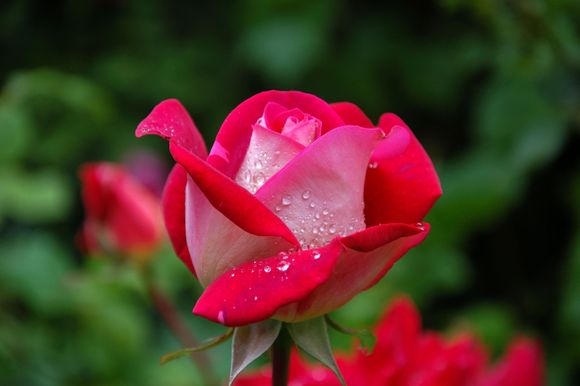"The rose is the only thing you can take with you to the afterlife, for it is not of this world."
(Persian wisdom)
Ah, these roses, so charismatic, in themselves iconic symbols of romance and love. The very word "rose" seems to bring freshness and coolness to our thoughts, freeing up little room for love. It is difficult to find a person who does not admire the aroma and beauty of these bright flowers. A single flower can allow us to express our feelings without a word being uttered, and this is the rose.
But besides being beautiful, it can also be useful for the skin with its antiseptic and antibacterial properties. We will tell you in detail about them in the article.
Image by Pixabay from pexels
Rosa damascena - why is it so valuable
Rosa damascena mill L., known as Gole Mohammadi, is one of the most important types of flowers of the Roseflower family. R. damascena is a decorative plant and besides the perfumery effect, several pharmacological properties have been established and studied for this plant, including anti-HIV, antibacterial, antioxidant, anti-cough, hypnotic, antidiabetic and relaxing action. [ref.1] Besides them, the benefits for beauty and skin are no less significant - in acne, sensitive skin on the face or scalp, and much more that we will tell you about.
A brief historical report shows that this scent was known and preferred thousands of years back in time. There are reports that indicate that many years ago several civilizations used rose water in their spiritual rituals and procedures [ref.2]. Rose water is mentioned in the ancient medical texts of countries such as China, India, Persia, Assyria, Egypt, Greece and Rome.
An interesting assumption in this regard comes from Ancient Egypt. Cleopatra used rose oil as an aphrodisiac about 3,000 years ago. It is believed that old civilizations such as Babylonia used rose oil and rose water in their medicines and rituals. At the same time, in India they were used in royal kitchens for the needs of the royal family.
Ancient Rome revered rose water for its antiseptic and antibacterial properties. They preferred it for both hand washing and body bathing.
In the Middle Ages, rose water was used to overcome stress and depression, to relieve tension and anxiety. And today, rose water is used for many purposes in every household, including personal care.
The extraction of essential oil from the colors began around the 7th century BC. Hr. In Iran, as Rosa damascena was transferred to Europe later and successfully cultivated in European countries. Today Bulgaria and Turkey are the main producers of R.damascena essential oil in the world, and Bulgarian R.damascena oil is best known and revered as "liquid gold".
There is evidence that the Rosaceae family is an ancient plant. Rose fossils were discovered in America and date back nearly 30 million years. [ref.2]
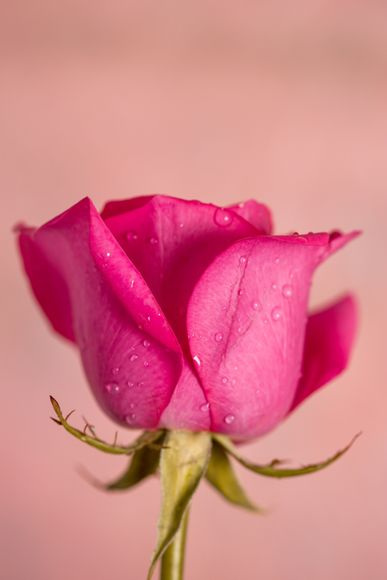
Photo by Thais Do Rio on Unsplash
Useful properties of rose water
Skin elixir
Rose water is used in cosmetic care by many women and rightly so. It provides a wide range of benefits for the skin. Rose water is a very good means of purifying the skin and protects it from bacterial infections. [ref.3] It is also a wonderful tonic as it tones the skin and helps remove dirt, traces of make-up and fatty secretions that we naturally release.
With rose water, sunburns and wounds can also be relieved and extinguished, and the risk of allergic reactions is practically zero. Rose water also helps to stimulate circulation in the skin and reduces varicose veins and varicose capillaries. No less important is that rose water contributes to maintaining the pH balance in the skin, which is extremely important for its long-term health and has a calming effect in acne and eczema. [ref.4]
Anti-inflammatory agent
Extracts extracted from the petals of Rosa damascena (Rosaceae) are used in Iranian folk medicine as healing agents in some inflammatory diseases. [ref.5] In another study, inhibition of neutrophil adhesion and antimicrobial activity by diluted hydrosol derived from Rosa damascena was found. Hydrosol, prepared from the colors of Rosa damascena (rose water), is traditionally used for various health problems, including skin irritations such as erythema multiforme, itching, swelling and others. [ref. 6, 7] It is clear from the results in the studies that rose water has a potential positive effect for inhibiting inflammation of the skin caused by microbes.
Rose water is rich in vitamins A and C, which exhibit strong anti-inflammatory properties and can help soothe irritated skin.
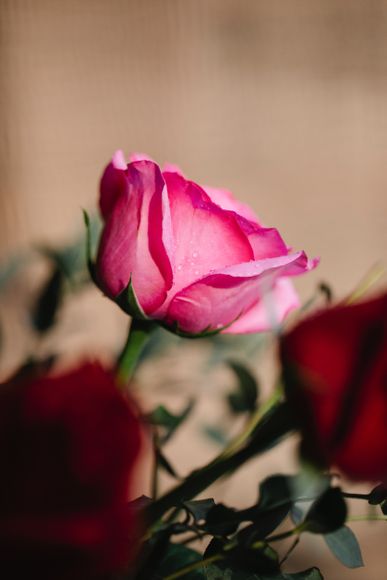
Photo by Michelle Leman from Pexels
A gift for soothing the eyes
Rose water is very effective at soothing tired and tense eyes, and such a problem is increasingly common in today's digital world, in which we are all in front of "smart" screens. It is good for those people who spend long hours in front of a computer for work, to try the power of rose water to relieve tension in the eyes. Applying rose water to the eyes, for example, through cotton, gives shine to the soft skin in this area and relieves them of tension.
Dark circles under the eyes can also be influenced by gentle rose water, as evidenced by a paper published in the Journal of Traditional and Complementary Medicine [ref. 8] According to the team of researchers, rose water and its components have an antiviral effect against herpes simplex viruses, as well as against antimicrobial action against bacteria:
- Xanthomonas vesicatoria
- Chromobacterium violaceum
- Erwinia carotovora strains
- Staphylococcus aureus
- Bacillus Cereus
- Staphylococcus Epidermidis
- Pseudomonas fluorescens
- Pseudomonas aeruginosa
- Escherichia coli
- Proteus vulgaris
- Candida albicans
- Enterococcus faecalis and others.
Relief of chest pain and painful menstruation
The anti-inflammatory effect of rose leaf tea and vitamin profile help reduce dysmenorrhea or menstrual pain in women. A double-blind cross-clinical trial in 92 girls showed that ethanol extract from the fruits of R. damascena had similar efficacy to that of mephenamic acid to reduce pain in primary dysmenoreal syndrome (PMS), without side effects. [ref.9]
Support digestion
Drinking rose water can also help reduce symptoms of bloating and an "irregular stomach." It is known to improve digestion by increasing bile flow and can also act as a laxative, improving intestinal motor skills. Therefore, rose water can also be taken for constipation.
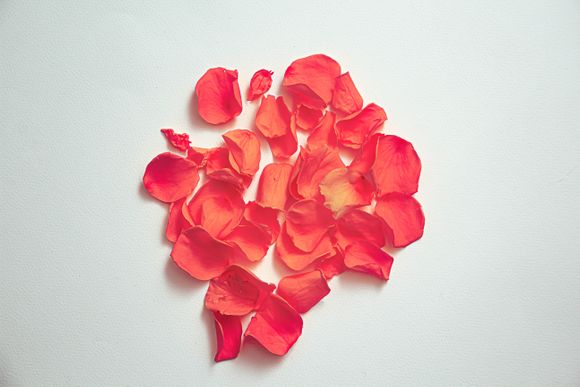
Recipes for preparing at home
The main advantages of rose water are that it has a wonderful aroma, can help with anxiety and depression and has powerful antiseptic properties that can help prevent and treat infections. And another advantage is the ease with which it is prepared at home.
Recipe for organic rose water
All you need is 4-5 colors of fragrant organic roses, water and a few ice cubes.
Remove the pink colors from the stems and carefully rinse them to remove dirt. Place a bowl in the center of an empty saucepan, then add the rose petals around the bowl. Add water (enough to cover the petals) and heat the heat to simmer. Put the lid upside down - this will help capture the pink water vapor for this method of distillation.
Add ice to the top of the lid of the pan. As soon as the ice has melted, add more cubes. This helps to condense the evaporated rose water. Keep repeating this step.
In about 30 minutes, the rose water will be ready. It must have condensed into the bowl you put in the middle of the pot. Pour the rose water into a clean glass container. Store in a cool, dry place to keep it lovely and intact.
It is important to follow a few guidelines when selecting roses - you can use any kind of rose petals to make rose water, but first make sure that the petals meet these requirements:
- Organically grown or without pesticides - you do not want to use roses that have taken harmful chemicals on them. Most roses are grown to be placed in vases, not distilled for oral intake. So if you are buying from a florist or farmers market, make sure that no pesticides are used in their cultivation.
- Not grown near a road - flowers grown near a street will absorb additional contamination and should not be consumed.
- Check if you are allergic - test the petals of the flowers on your forearms, carefully dragging them along your skin to make sure you are not allergic to them.
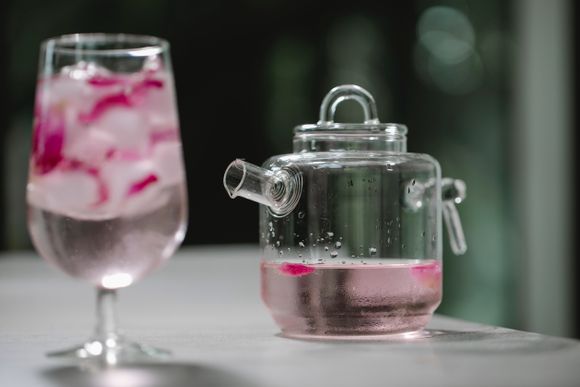
Photo by Charlotte May from Pexels
Rose water for facial cleansing
It is very easy to prepare rose water for cleaning a face with the right instructions.
Rose water is a gift from nature that can do wonders with the skin. It is no coincidence that rose water is used as an ingredient in many cosmetic products due to its refreshing aroma and beneficial properties for the skin. It acts toning and soothing, nourishes and maintains the youthful appearance of the skin and protects it from damage.
Here are the steps you need to follow to prepare rose water:
- Collect some fresh rose petals early in the morning after sunrise.
- Wash the petals thoroughly with clean water.
- Place the petals in a large saucepan with distilled water (necessarily distilled).
- Pour water to cover the petals.
- Cover the pan with a lid and leave over a low heat.
- Wait for the water to burn until it acquires the color of the rose petals.
- Strain the water, leave to cool, and then store in a suitable glass container.
More rose water applications
You can add rose water to the rituals you give yourself daily for more health, tranquility and vitality by selecting a few ideas in the following list:
- Tonic - just add a little on a cotton swab and carefully apply on a clean face
- Elixir - add rose water to a spray bottle to revive the withered skin and get a fresher look
- Eye mask - soak a cotton swab in chilled rose water and put on the eyelids
- Cleansing the scalp - use as a last rinsing after balm or mask during bathing
- Make-up remover - mix 1:3 rose water and coconut oil, shake to mix well and use for demakiage
- Stress relief – add a little rose water to the warm bath
- Rose water for drinking - can help healthy and balanced intestines and counteract pathogens
One thing is for sure: rose water is the secret to beauty, in which many women swear and maintain clean beautiful skin, but rose water is multi-lyca and proves useful for what we carry inside the surface.

